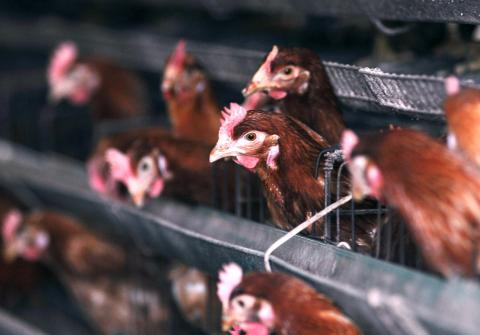Chinese health authorities on Saturday confirmed three cases of a strain of avian flu that had not been found in humans before.
Two of the patients have died in Shanghai and one is still critically ill in Anhui Province, the Centers for Disease Control (CDC) said yesterday.
CDC Deputy Director-General Chou Jih-haw (周志浩) said that 88 people have had close contact with the three patients, but the Chinese health agency said that so far they have not displayed any symptoms.

Photo: AFP
Chou said that although three human cases of H7N9 infection have been confirmed, it is still not clear whether this strain of avian influenza can be transmitted though human-to-human contact.
“In Taiwan, we used to find H7N3 and H7N7 virus infections in poultry, but that has not been the case with H7N9,” Chou said. “The CDC has tested more than 3,000 cases of influenza infection since October last year, but has yet to find any cases of the H7N9 virus. Of the 136 cases of unexplained pneumonia investigated, three were found to be H3N2 and one H1N1; again none tested positive for H7N9.”
Although most avian influenza viruses do not affect people, some do. One of these is H5N1, a highly pathogenic avian influenza virus.
“As of March 4, WHO data showed that there have been 622 confirmed cases of H5N1 infection, as a result of which 371 people died, amounting to a mortality rate of almost 60 percent,” Chou said.
The CDC said it has stepped up inspections and monitoring of people arriving from China, Hong Kong and Macau. Those who develop symptoms of infection or have been in contact with poultry are to be sent to hospitals to be tested for the virus and not discharged until cleared of infection.
In addition, he said that people who plan to travel to China “should avoid any form of contact with poultry and if they have developed any of the above-mentioned symptoms, they should inform officials at ports of entry when they return.”
CDC Director-General Chang Feng-yi (張烽益) told a legislative hearing that while Taiwan has no recorded cases of human H7N9 infections, precautionary measures have been stepped up in light of the cases in China.
Immigration officials at Taiwan Taoyuan International Airport have been asked to intensify monitoring and inspection of passengers from China, Hong Kong and Macau, Chang said.
Meanwhile, the government has extended public access to subsidized anti-viral influenza drugs until the end of this month, as a precaution against a possible outbreak of the virus.
Although there is no specific vaccine against the virus, existing information shows that H7N9 infection can be treated with Tamiflu, Chang said.
The CDC has been monitoring cases of pneumonia of unknown etiology and flu-like illnesses on a regular basis, but has not detected any H7N9 infections so far, he said.

Seventy percent of middle and elementary schools now conduct English classes entirely in English, the Ministry of Education said, as it encourages schools nationwide to adopt this practice Minister of Education (MOE) Cheng Ying-yao (鄭英耀) is scheduled to present a report on the government’s bilingual education policy to the Legislative Yuan’s Education and Culture Committee today. The report would outline strategies aimed at expanding access to education, reducing regional disparities and improving talent cultivation. Implementation of bilingual education policies has varied across local governments, occasionally drawing public criticism. For example, some schools have required teachers of non-English subjects to pass English proficiency

‘FORM OF PROTEST’: The German Institute Taipei said it was ‘shocked’ to see Nazi symbolism used in connection with political aims as it condemned the incident Sung Chien-liang (宋建樑), who led efforts to recall Democratic Progressive Party (DPP) Legislator Lee Kun-cheng (李坤城), was released on bail of NT$80,000 yesterday amid an outcry over a Nazi armband he wore to questioning the night before. Sung arrived at the New Taipei City District Prosecutors’ Office for questioning in a recall petition forgery case on Tuesday night wearing a red armband bearing a swastika, carrying a copy of Adolf Hitler’s Mein Kampf and giving a Nazi salute. Sung left the building at 1:15am without the armband and apparently covering the book with a coat. This is a serious international scandal and Chinese

TRADE: The premier pledged safeguards on ‘Made in Taiwan’ labeling, anti-dumping measures and stricter export controls to strengthen its position in trade talks Products labeled “made in Taiwan” must be genuinely made in Taiwan, Premier Cho Jung-tai (卓榮泰) said yesterday, vowing to enforce strict safeguards against “origin laundering” and initiate anti-dumping investigations to prevent China dumping its products in Taiwan. Cho made the remarks in a discussion session with representatives from industries in Kaohsiung. In response to the US government’s recent announcement of “reciprocal” tariffs on its trading partners, President William Lai (賴清德) and Cho last week began a series of consultations with industry leaders nationwide to gather feedback and address concerns. Taiwanese and US officials held a videoconference on Friday evening to discuss the

PERSONAL DATA: The implicated KMT members allegedly compiled their petitions by copying names from party lists without the consent of the people concerned Judicial authorities searched six locations yesterday and questioned six people, including one elderly Chinese Nationalist Party (KMT) member and five KMT Youth League associates, about alleged signature forgery and fraud relating to their recall efforts against two Democratic Progressive Party (DPP) legislators. After launching a probe into alleged signature forgery and related fraud in the KMT’s recall effort, prosecutors received a number of complaints, including about one petition that had 1,748 signatures of voters whose family members said they had already passed away, and also voters who said they did not approve the use of their name, Taipei Deputy Chief Prosecutor